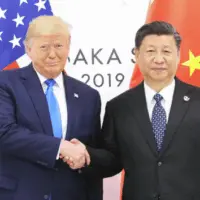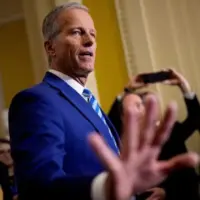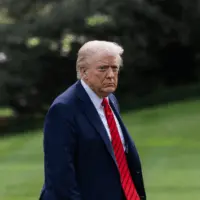
(WASHINGTON) — Just weeks before the planned meeting between President Donald Trump and Chinese President Xi Jinping in South Korea, China dramatically expanded its restrictions on rare earth minerals, a move the Trump administration sees as a sharp escalation in China’s efforts to tighten its grip on global manufacturing.
China’s new rules, which apply to all countries, are set to take effect in phases on Nov. 8, then Dec. 1.
“It is an exercise in economic coercion on every country in the world,” Ambassador Jameison Greer said Wednesday during a press conference alongside Treasury Secretary Scott Bessent. “This will give China control over basically the entire global economy and the technology supply chain.”
The move prompted Trump to threaten 100% tariffs on all products from China starting Nov 1st. So far, Beijing hasn’t shown any public indication that it’s pulling back on its controls, but Bessent remains sanguine.
“I am optimistic that this can be de-escalated. Ultimately, we are confident in the strong relationship between President Trump and President Xi,” Secretary Bessent said. ” We’ve had substantial communication with the Chinese over the past few days, and we believe that there will be more forthcoming this week.”
Some experts say Beijing is playing hardball to increase its leverage in these upcoming talks, while undercutting U.S. efforts to boost its industrial base.
Bessent said Wednesday that Trump is still expected to meet with Xi in South Korea despite the tariff threats.
The Chinese government stated on Sunday that it does not want a trade war, but it will also not shy away from it.
“On the tariff issue, China’s position remains consistent: we do not want a trade war, but we are not afraid of one,” China’s Ministry of Commerce said in a statement Sunday. “If the U.S. persists in its course, China will resolutely take appropriate countermeasures to safeguard its legitimate rights and interests.”
China’s move to restrict rare Earth minerals could have global implications.
The restrictions affect a wide swath of the U.S. and global economy. Rare earths are key to producing computer chips, which are needed for many things like smartphones and AI systems. They’re also critical to making magnets to power drones, robots and cars. Rare earths are also crucial for defense technology, including F-35 fighter jets, Tomahawk missiles, and radar systems.
The restrictions mean that foreign firms must obtain Chinese government approval to export products that have even trace amounts of certain rare earths that originate from China.
Given that China is overwhelmingly dominant in this sector, this could have major national security implications.
Ambassador Greer gave an example on Wednesday, saying that “if a car is built in America and sold in Mexico, you would need to seek approval from China before making a sale because of the chips in the car.”
The broad scope of this rule from China is similar to how the U.S. has implemented export restrictions to control chip production around the world that uses American technology.
The sweeping new restrictions are a sign, some analysts say, that China wants the U.S. to roll back its own export controls, and that this fight is about more than just tariffs.
Copyright © 2025, ABC Audio. All rights reserved.














